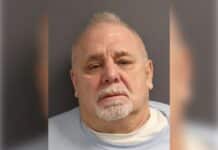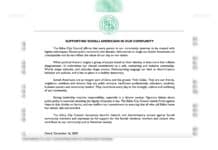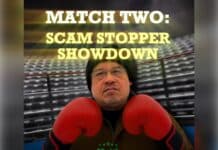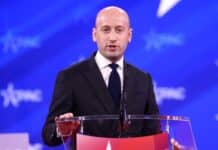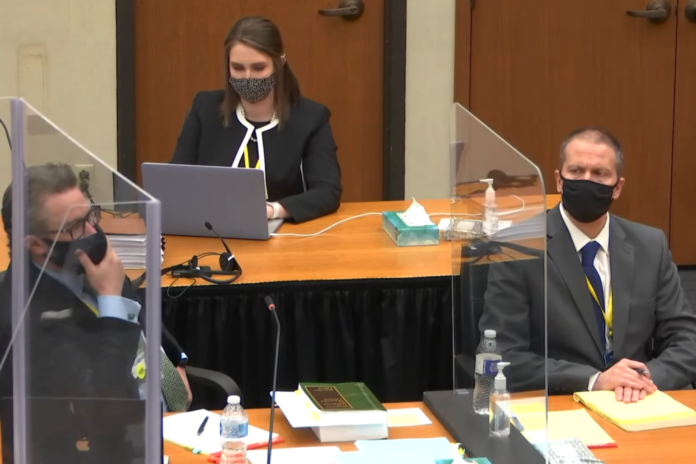
(Power Line) — In the time reserved for motion hearings yesterday morning Judge Cahill heard defense counsel Eric Nelson’s offer of proof on George Floyd’s May 2019 encounter with the Minneapolis police. Floyd was high at the time and in medical distress. Previously ruled inadmissible, Judge Cahill indicated he would revisit the issue and took it under advisement. He indicated he would announce his ruling on Thursday, as I understood his comments. My assessment is that the evidence may be admissible in part insofar as it bears on the cause of death, but it is otherwise not coming in.
Although precisely no jurors were seated, the day proved interesting and eventful in its own way. Judge Cahill announced that he would himself conduct voir dire of the seven jurors selected last week to ascertain their awareness of the $27 million wrongful death settlement in the related civil litigation. As I understood the arrangements, he will briefly examine each available juror via Zoom this morning.
He has also taken defense motions for a continuance and change of venue under advisement. He should have something to say about these motions soon, if not today.
Nelson also raised the issue of pretrial publicity in the context of the wrongful death settlement. He cited the March 12 Washington Post story in which an unnamed city official expressed his awareness of the possible impact of the settlement on the criminal case and spoke with Chief Hennepin County District Judge Toddrick Barnette. Nelson referred to this passage in the Post story:
“A Minneapolis official said the city had been concerned that the announcement could affect the trial.
The official, who was not authorized to speak publicly, said the city consulted with Hennepin County Chief District Judge Toddrick S. Barnette, who told the city it could proceed. Barnette did not immediately respond to a request for comment.”
Having taken up the issue with Judge Barnette, Judge Cahill disputed the accuracy of “the official’s” account of his conversation. Judge Barnette was said to have advised the city that he had no control over its handling of the federal wrongful death case. Judge Cahill quoted him as saying words to the effect that “We can’t tell you what to do,” not as authorizing the announcement of the settlement.
Expressing his annoyance, Judge Cahill observed, “I think the city is trying to dump their responsibility back on the court, where it does not belong.” My notes reflect that Judge Cahill said he would deal with this today, but I’m not sure what that means.
Minnesota Attorney General Keith Ellison was, as usual, in the courtroom yesterday. His office is handling the prosecution of Chauvin with the assistance of an all-star team of outside attorneys who are contributing their services. The Star Tribune reports that Ellison was guarded on the settlement. He “declined to comment when asked by a reporter whether he or the court knew that a settlement had been reached before it was announced Friday. His son Jeremiah Ellison is a Minneapolis City Council member and voted for the settlement.”
Judge Cahill also expressed particular concern about Tim Arango’s February 10 New York Times story on the negotiations of a guilty plea in this case based on unnamed law enforcement sources.
Jurors 63, 64, and 66 were excused for cause. Juror 67 was up next. I have early in my notes on Nelson’s examination of him that he was “dangerous for the defense.” He is the director of a youth organization — a youth ministry, I think — who wanted to serve as a juror. He “would like to participate in justice,” as he put it in the responses to the juror questionnaire. He had formed the opinion that “Floyd’s death is wrong and we should speak up,” or words to that effect. However, he professed concerns both for Floyd and for Chauvin. He had prayed for everyone involved in the case. He would follow the law as given by Judge Cahill. Nelson exercised a peremptory challenge to strike him (his tenth of 15).
Juror 69 was the last examined before lunch. He was aware of the $27 million wrongful death settlement and understood it had no bearing on the criminal case. He said he was not excited about sitting as a juror in this case of “global scale” and would have concerns about his safety “whichever way it would go.” I don’t really think he would have worries about his safety in the event of Chauvin’s conviction, but that is how it goes with some prospective jurors. Speaking circumspectly, he subsequently conceded he would have “more concerns” if the case resulted in a not guilty verdict.
He observed that the media coverage of the case had evolved in the days following May 25 from “the death of George Floyd” to “the murder of George Floyd.” I have down in my notes that he adopted this media stance. His juror questionnaire indicates that he has formed a “very negative” opinion of Derek Chauvin. The presumption of innocence would accordingly be difficult to afford in this case, but he stated that he could set aside his preconceptions to do the right thing. He understood that “the right thing” might be finding Chauvin not guilty. He stated that he could serve as an impartial juror in the case. I have in my notes at this point that he was “obviously tough for the defense.” He had formed the opinion that what happened to Floyd was an injustice. Nelson exercised a peremptory challenge — his eleventh of 15 — to strike him.
Having thought about it over lunch, Nelson had second thoughts. He moved to have his peremptory restored and juror 69 stricken for cause. He asked Judge Cahill to presume the prejudice of prospective jurors from the pretrial publicity. He referred to the prejudicial statements made about Chauvin’s guilt by “elected officials” roughly from the day of Floyd’s death. He asked for “more latitude” ta examine prospective jurors about the settlement.
In response, Steve Schleicher — the Maslon lawyer who is contributing his services to the prosecution — pooh poohed Nelson’s concerns about the settlement. He described them as overblown. With respect to juror 69’s professed ability to disregard the settlement, Schleicher argued that Nelson was “asking for a presumption of lying.” What we have here is “elected officials” doing their job. Schleicher deserves some kind of award for his ability to keep a straight face.
Schleicher added that the court had 329 prospective jurors at its disposal and had set aside three weeks for jury selection. There is world enough and time to get the job done. He urged Judge Cahill “not to overreact to what’s been happening.” Juror 69 had “demonstrated no reason to strike him for cause.”
Judge Cahill denied Nelson’s attempted reclamation of his peremptory, but his remarks revealed the misguided constraints Nelson seems to have imposed on himself in voir dire. Judge Cahill stated that he would exercise discretion in making the judgment whether a prospective juror could in fact be fair and impartial. He can’t presume prejudice, he said, and he did not see juror 69 to be lying, but some jurors “lack the introspection” to acknowledge they can’t be fair. He will make the judgment based on his reading of jurors under the circumstances. My translation is that Nelson should at the least have moved to strike juror 69 (and others) for cause.
Jurors 71 and 73 consumed the rest of the afternoon. They were both stricken for cause, 71 on Nelson’s motion and 73 on Schleicher’s.
UPDATE: In comments Wednesday morning Judge Cahill stated he will rule orally on the pending motions referred to above on Friday morning. Judge Cahill conducted void dire of the seven jurors selected before the city’s $27 million settlement of the Floyd case took place this morning and excused two of the seven for cause. As we crank up today, we have gone from nine to seven jurors on our way to 14.

